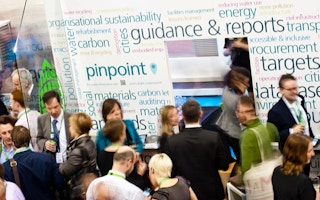Whatever the global climate agreement reached next year in Paris looks like, the private sector will need to dramatically step up efforts to cut global carbon emissions, negotiators and analysts said at UN climate talks in Lima Thursday.
Political leaders including US Secretary of State John Kerry, UN Secretary-General Ban ki-Moon and Peru’s President Ollanta Humala urged the private sector to play a bigger role in cutting carbon emissions because it makes good business sense.
Lima is the last major conference before the world is meant to reach agreement in Paris late next year on climate action beyond 2020.
Companies have long been peripheral in the UN-backed talks, but the leaders said the need to engage private capital is becoming increasingly obvious, given the scale of the problem.
“Climate change is a challenge which requires comprehensive action at all levels. We need convergence between leaders of indigenous peoples, the private sector and governments,” said Peru’s Humala.
“
The energy market today is a $6 trillion market with 4 to 5 billion users which will go up to 9 billion users. This is an opportunity to put millions of people to work building the infrastructure, doing the transition
US Secretary of State John Kerry
Falling investment
Total climate-friendly investment fell in 2013, to $331 billion from $359 billion the year before, partly reflecting falling costs of renewable energy, but also lower investment in low-carbon projects, according to the Climate Policy Initiative, which works on energy and land use policy.
That lags far behind the $5 trillion to $6 trillion that the International Energy Agency says is needed in low-carbon energy investment through 2020.
“We are getting further behind what is needed,” said Barbara Buchner, senior director of the Climate Policy Initiative, at Lima.
An agreement in Paris could boost low-carbon investment by promoting carbon markets, and by giving investors confidence that the low-carbon sector will grow.
A Paris Agreement that, at a minimum, refers to the use of carbon markets and rules out double-counting of emissions would likely unlock new rules in subsequent agreements that could spur emissions trading.
Rich countries could then look at funding carbon emissions cuts in poorer countries, where it is usually easier and cheaper than at home. That could see quicker and deeper cuts to CO2 emission levels.
“We’re in a really positive place for carbon markets and the signals are there,” said Kelly Kizzier, a member of the European Commission’s negotiating team.
Dirk Forrister, head of the International Emissions Trading Association, suggested that the agreement reached in Paris might be quite short and countries could add more detailed emissions trading rules at subsequent meetings.
Low caprbon opportunities
By mobilising investments through low-carbon energy policies, governments could create a huge market opportunity, US Secretary of State John Kerry told reporters at the Lima negotiations.
“The energy market today is a $6 trillion market with 4 to 5 billion users which will go up to 9 billion users. This is an opportunity to put millions of people to work building the infrastructure, doing the transition,” he said.
“The global energy market of the future is poised to be the largest market the world has ever known.”
Earlier this year, the Global Commission on the Economy and Climate calculated that a transition to a low-carbon economy would generate large benefits, and concluded climate action and economic growth were not at odds.
“This is now possible in part because of new technological developments and human ingenuity that have radically reduced the costs of clean alternatives” said the former Mexican president Felipe Calderon, chair of the commission.
Al Gore, former US vice president, estimated huge potential energy savings as a result of growing innovation in information technology, transport and energy.
“Information technology gives us the means to harvest the enormous opportunities represented by inefficiency,” he told an event on the sidelines of the conference.
“It is relatively easy now to design and build zero carbon buildings. The savings in energy, material costs and the reductions in global warming pollution are not minor. We’re talking about 50, 60, 70, 80 even 90 per cent savings in category after category,” he said.

















